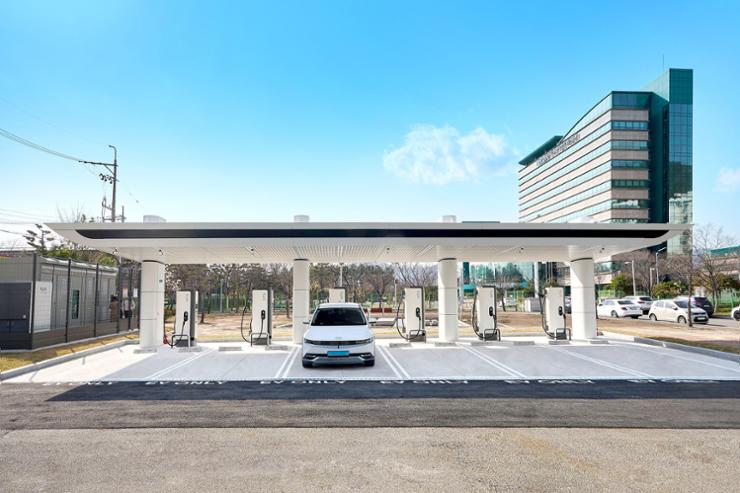
SOUTH KOREA. Hyundai Motor Group to double number of EV chargers nationwide
Hyundai Motor Group will expand the number of its high-speed electric vehicle (EV) battery chargers in Korea to 500 by 2025, almost double the current 286, as part of its effort to offer a fast charging service to customers, the automotive group said Sunday.
The company began operating its E-pit EV charging stations in April 2021 by installing 72 EV chargers at 12 highway rest areas. Including the E-pit EV charging station in Busan, which the carmaker recently opened, there are currently 54 E-pit EV charging stations across the country as of March.
“E-pit charging stations are designed to [be] the best charging stations in Korea. In particular, all outdoor E-pit charging stations are equipped with canopies that can be used regardless of weather conditions and are self-lit at night for safe and convenient charging,” the company said. “By 2025, we plan to build a total of 500 EV chargers, an increase of about 600 percent from 2021.”
At the E-pit stations, users can use either a 400-volt charger or an 800-volt charger, which can charge the IONIQ 5 EV’s battery from 10 percent to 80 percent within about 18 minutes.
According to Hyundai Motor Group, the average charging time for its EVs made with the E-GMP EV platform in 2023 was 18.5 minutes, which is the shortest amount of time among all EVs, indicating that customers have been experiencing a fast and convenient charging experience.
The group’s EVs made with the E-GMP platform include the Hyundai IONIQ 5, the IONIQ 6, the Kia EV6, EV9 and Genesis GV60, the GV70 and the GV80.
The group added it has played a leading role in the development of the EV ecosystem to offer a better charging experience.
In addition to the E-pit charging station service, Hyundai Motor Group is working on improving charging accessibility for EV drivers by installing an additional 3,000 ultra-fast charges through its affiliate Korea Electric Vehicle Charging Service and 20,000 standard chargers through Hyundai Engineering by 2025, Hyundai said.
The EV charger expansion plan is also in line with the government’s policy to offer better EV charging services to EV drivers.
To support the stable growth of the domestic EV charging service, the Ministry of Environment has allocated 371.5 billion won ($276.3 million) in subsidies for the installation of public charging facilities this year, up 42 percent from the previous year.
As of December, the number of EVs per charger in the country was around 1.85, one of the highest in the world, according to the ministry, with 305,309 chargers and 565,154 vehicles.
The country aims to have 1.2 million chargers installed by 2030 to increase accessibility.